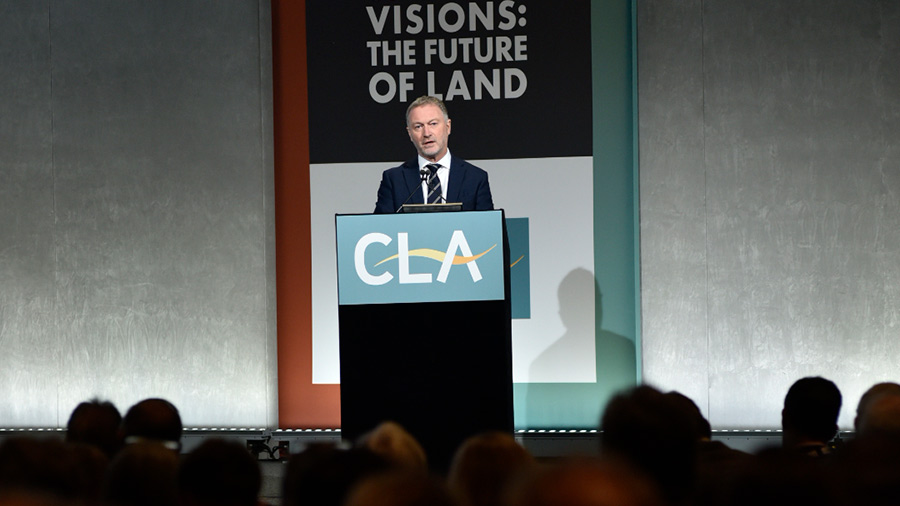Ag budget increase must wait until economy grows, says Labour
 Shadow Defra farming secretary Steve Reed at the 2023 CLA conference © CLA
Shadow Defra farming secretary Steve Reed at the 2023 CLA conference © CLA Labour’s shadow Defra secretary, Steve Reed, has said the economy will need to grow before his party can increase the agriculture budget if it wins the next election.
Party leader Keir Starmer has already set out plans to boost spending on two “priority areas” – the NHS and police – but Mr Reed said these would not be added to because Labour was “sticking to the fiscal rules”.
See also: ‘I’m on a learning curve’, says Labour shadow Defra secretary
“People are already facing the highest level of personal taxation since World War Two,” he told journalists at the CLA conference in London yesterday (30 November).
“You cannot possibly go to people and demand more taxes from them when that’s the situation.
“People are hurting. We have to grow the economy; that’s how we boost people’s wages and get money into the Treasury and invest in the many other priorities people will have.”
Speaking to Farmers Weekly after the event, Mr Reed outlined a number of policies that he suggested would ease the burden on farmers.
“First, we will cut energy bills for our farmers, establishing GB Energy, which will harness the power of clean energy.
“This will directly reduce the soaring prices of fertilisers and animal feed,” he said.
“Second, we will reform the planning system, bringing the wait from years to months, enabling farmers to rapidly plug their renewable energy into the grid.”
He went on to reiterate a previous commitment to ensure more food bought by the public sector is locally sourced and said Labour would ensure farmland is better protected from flooding with new drainage systems, flood defences and natural flood management schemes.
New Defra secretary Steve Barclay, meanwhile, used his speech at the conference to announce £45m-worth of grant funding.
He also said he had “always been clear” that farmers needed protecting, noting a time when he had blocked a plan to introduce vegetarian diets in some schools as health secretary.
Asked whether he wanted to do anything different to his predecessors, he said: “The absolute focus is on automation and productivity.”
When challenged by Farmers Weekly on whether this was a real point of difference, he added: “When you look at AI [artificial intelligence] and its potential, I don’t think that was particularly visible to people five years ago, in the same way.
“There are significant opportunities around automation and that’s something I want to change.”
Editor’s View: Battle for rural vote will be fought on a pin

With Farmers Weekly editor Andrew Meredith
They were, in my imagination before the event, like two bulls kept penned apart for safety.
A coffee break had been inserted between their speeches to the Country Land and Business Association (CLA) conference. Was it after a risk assessment, to stop them locking horns?
Both in blue suits. Both with grey hair. Both called Steve. A diversity contest this was not.
I am of course talking about the new Defra secretary Steve Barclay, of the Conservative party, and Labour’s shadow Defra secretary Steve Reed in their first public skirmish ahead of the many election battles to come.
As the current Defra boss Steve B was permitted to land the first blows. He wanted to back British farming and speed up planning decisions.
Then it was the turn of challenger Steve R. He wanted to speed up planning decisions and back British farming.
By this point, we had all been rocked back in our seats. What a contest of ideas!
What about the rumours of a Scottish-style right to roam, a sensitive topic among England’s landowning elite?
Steve B said it was “about responsible access to the countryside”. Steve R said it was about “responsible access to nature”.
These were not two pugilists duking it out with competing visions. They were wrapped in a warm embrace on the head of a pin.
Steve B said he had carefully consulted with three of his predecessors upon taking the job – Liz Truss, George Eustice and Therese Coffey (no offence to the microsecond minister Ranil Jayawardena I’m sure) – and lauded the mounting pile of Sustainable Farming Incentive applications on his desk.
Steve R said he was not planning substantial changes to the ELM scheme either, and had not even looked at how his Labour comrades in Wales were proceeding with their own agricultural policy reform.
(Quote of the day on this topic to new CLA president Victoria Vyvyan for describing the Welsh transition as “on hiatus, although less polite words than hiatus are available”.)
So does this make Mr Reed akin to a Conservative, or Mr Barclay fairly Labour-ish?
Both. The former ducked an opportunity to call for increased spending on environmental issues by citing fiscal prudence.
And the latter has just shown some leg to urban voters by launching a search for a new National Park to help improve public access to rural areas.
In 2017, Michael Gove was fond of saying we were in an “unfrozen moment” for environmental policy, where anything was possible.
Now it appears we are stuck in a glacier of pre-industrial revolution solidity. Yes, of course, whoever wins at the next election will lead differently to an extent.
For starters, both will be beholden to different chancellors with different views on how much of a priority the environmental budget is (with the CLA calling for it to rise to £4bn merely to keep up with inflation).
Unlike the Tories, Labour would rapidly bring down the curtain on badger culling, which may be enough to scare some livestock farmer votes given its contribution to England’s lowest TB incidence rate in at least 15 years.
Mr Reed also did more to set out a vision for the wider rural economy, with proposals for bolstering renewable energy and tackling the scourge of fly-tipping.
I can hear some of you out there tutting at a journalist wanting to see exciting division that will fill column inches, rather than predictable transition which will help with business planning.
Certainly it’s better if not all policies chop and change.
But blimey, it’s going to be a tedious campaign if this is as good as it gets.
